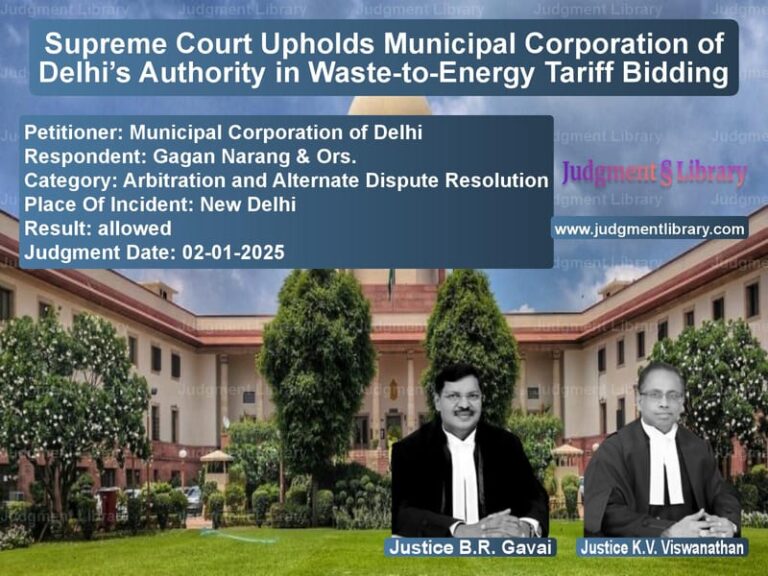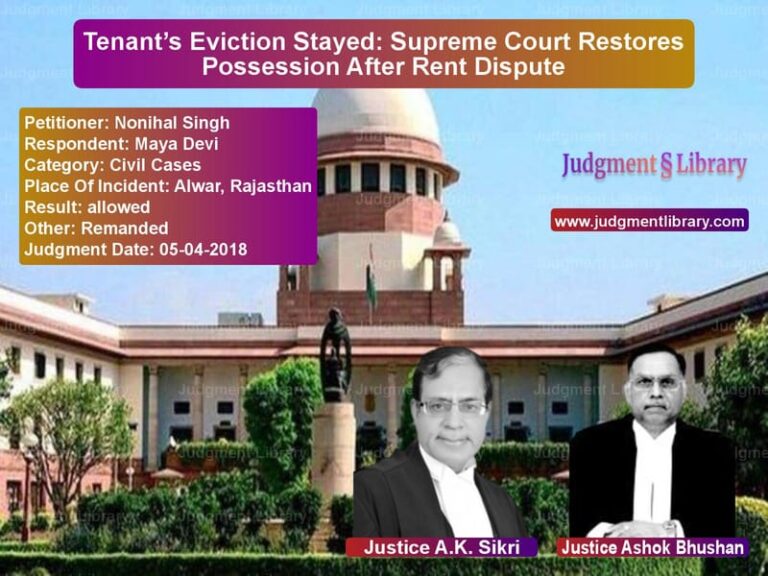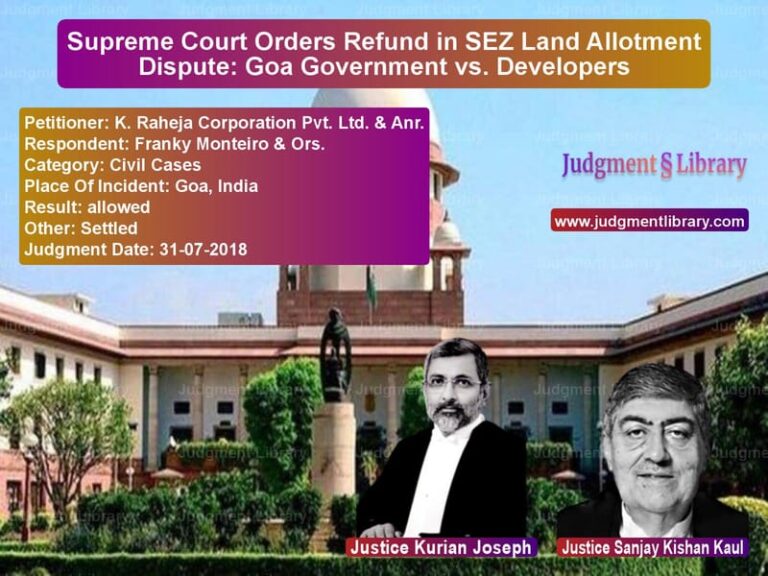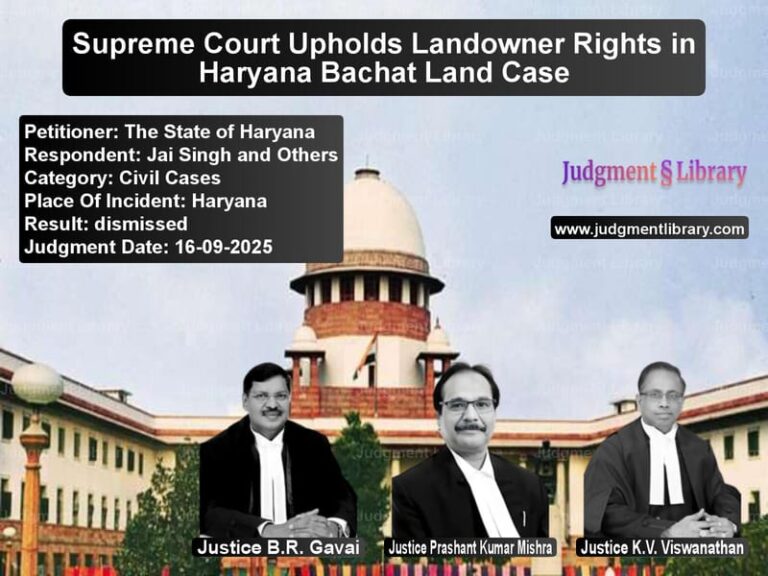Food Adulteration Conviction Overturned: Supreme Court Acquits Accused Due to Procedural Lapses
The case of Vijendra v. State of Uttar Pradesh highlights a crucial ruling by the Supreme Court regarding procedural irregularities in food adulteration cases. The Supreme Court overturned the conviction of the appellant, Vijendra, under the Prevention of Food Adulteration Act, 1954, due to non-compliance with mandatory procedural safeguards. The judgment serves as an important precedent in cases involving food safety regulations and the rights of the accused.
Background of the Case
The appellant, Vijendra, was convicted by the Judicial Magistrate, Hapur, Ghaziabad, for selling adulterated buffalo milk without a license. The prosecution was initiated based on a sample collected by a Food Inspector on October 16, 1979. The sample was later found deficient in milk fat by 12% and in non-fat solids by 27%, leading to charges under Section 7(1)/16(1)(a)(i) of the Prevention of Food Adulteration Act.
Chronology of Events
- On October 16, 1979, Food Inspector R.C. Kansal found Vijendra transporting buffalo milk for sale.
- The inspector purchased a sample and sent it for testing to the Public Analyst, Lucknow.
- The test report, dated November 15, 1979, confirmed the sample was adulterated.
- A prosecution sanction was obtained from the Chief Medical Officer on February 6, 1980.
- The complaint was filed before the court on March 18, 1980.
- The sample report was allegedly sent to Vijendra via registered post on April 7, 1980.
- The trial court convicted Vijendra, sentencing him to six months rigorous imprisonment and a fine of Rs. 1,000/-.
- The Additional Sessions Judge, Ghaziabad, upheld the conviction.
- The Allahabad High Court also dismissed the revision petition.
Arguments of the Parties
Petitioner’s (Appellant’s) Argument
- The independent witness (PW-3, Radhey Shyam) turned hostile, raising doubts about the sampling process.
- There was non-compliance with Section 10(7) of the Food Adulteration Act, which mandates the presence of an independent witness during sampling.
- The sample report was sent 19 days late instead of within the required 10 days, violating Section 13(2) of the Act.
- There was no proof that the report was actually received by the accused.
- The sampling process did not confirm that the milk was properly stirred before collection, affecting the accuracy of the fat content analysis.
Respondent’s (State’s) Argument
- The report was dispatched within a reasonable time, and minor procedural delays do not invalidate the prosecution.
- The accused had the option to apply for a second test at the Central Food Laboratory, but he did not exercise this right.
- Even without an independent witness, the testimony of the Food Inspector was sufficient to establish the offense.
Supreme Court’s Analysis
Procedural Violations in the Case
The Court closely examined the procedural lapses and found the following errors:
- Failure to Ensure Independent Witness: The prosecution’s independent witness (PW-3) turned hostile, making the Food Inspector’s testimony the sole basis for conviction. The Court ruled that this was insufficient.
- Delayed Delivery of Analyst’s Report: The Court emphasized that under Section 13(2) of the Prevention of Food Adulteration Act, the report must be sent to the accused promptly. In this case, the report was sent 19 days late, violating procedural safeguards.
- Failure to Prove Service of Report: There was no proof that the report was actually received by the accused, which deprived him of his right to request a re-examination by the Central Food Laboratory.
- Improper Milk Sampling: The Court noted that the method of collecting the sample was not properly documented. The fat content in milk depends on proper stirring before sampling. Since this was not confirmed, the accuracy of the test results was questionable.
Supreme Court’s Key Observations
“The very purpose of furnishing such a report is to enable the accused to seek reference to the Central Food Laboratory for analysis if dissatisfied with the report. This safeguard provided under Section 13(2) is a valuable right.”
“The uncorroborated testimony of the Food Inspector cannot be solely relied upon to sustain the conviction, especially when the independent witness has not supported the prosecution.”
Final Judgment
The Supreme Court ruled that due to the procedural lapses, the conviction of the appellant could not be sustained. It set aside the lower court judgments and acquitted Vijendra.
“The entire case of the prosecution is built upon the report of the Analyst, which was not served upon the appellant. In the absence of proof of delivery of the report, the conviction is not justified.”
The Court allowed the appeal and directed the appellant’s acquittal.
Significance of the Judgment
This ruling underscores the importance of procedural compliance in food safety cases and protects the rights of individuals accused under the Prevention of Food Adulteration Act.
- Ensuring Fair Trials: The judgment reinforces that procedural safeguards cannot be ignored, especially when they directly impact the rights of the accused.
- Burden of Proof on Prosecution: The prosecution must not only prove adulteration but also demonstrate compliance with all procedural requirements.
- Protection Against Unfair Convictions: The ruling ensures that individuals are not convicted based on flawed procedures or inadequate evidence.
Conclusion
The Supreme Court’s judgment in Vijendra v. State of Uttar Pradesh serves as a critical precedent in food adulteration cases. By upholding the necessity of procedural safeguards, the ruling protects individuals from wrongful convictions and ensures that food safety laws are enforced fairly and justly.
Petitioner Name: Vijendra.Respondent Name: State of Uttar Pradesh.Judgment By: Justice R. Banumathi, Justice A.S. Bopanna.Place Of Incident: Ghaziabad, Uttar Pradesh.Judgment Date: 31-07-2019.
Don’t miss out on the full details! Download the complete judgment in PDF format below and gain valuable insights instantly!
Download Judgment: Vijendra vs State of Uttar Prade Supreme Court of India Judgment Dated 31-07-2019.pdf
Direct Downlaod Judgment: Direct downlaod this Judgment
See all petitions in Legal Malpractice
See all petitions in Other Cases
See all petitions in Judgment by R. Banumathi
See all petitions in Judgment by A. S. Bopanna
See all petitions in allowed
See all petitions in Quashed
See all petitions in supreme court of India judgments July 2019
See all petitions in 2019 judgments
See all posts in Criminal Cases Category
See all allowed petitions in Criminal Cases Category
See all Dismissed petitions in Criminal Cases Category
See all partially allowed petitions in Criminal Cases Category







